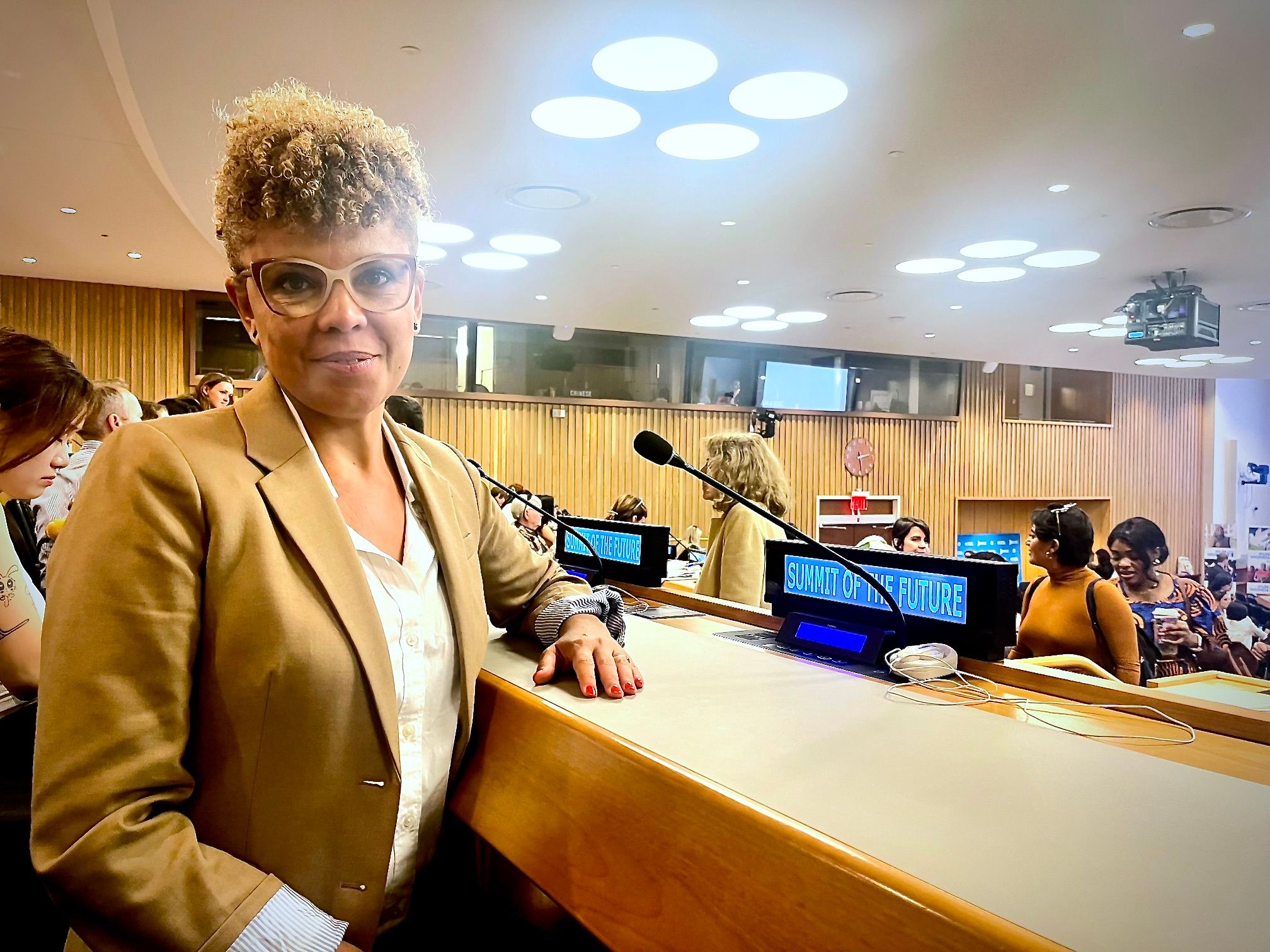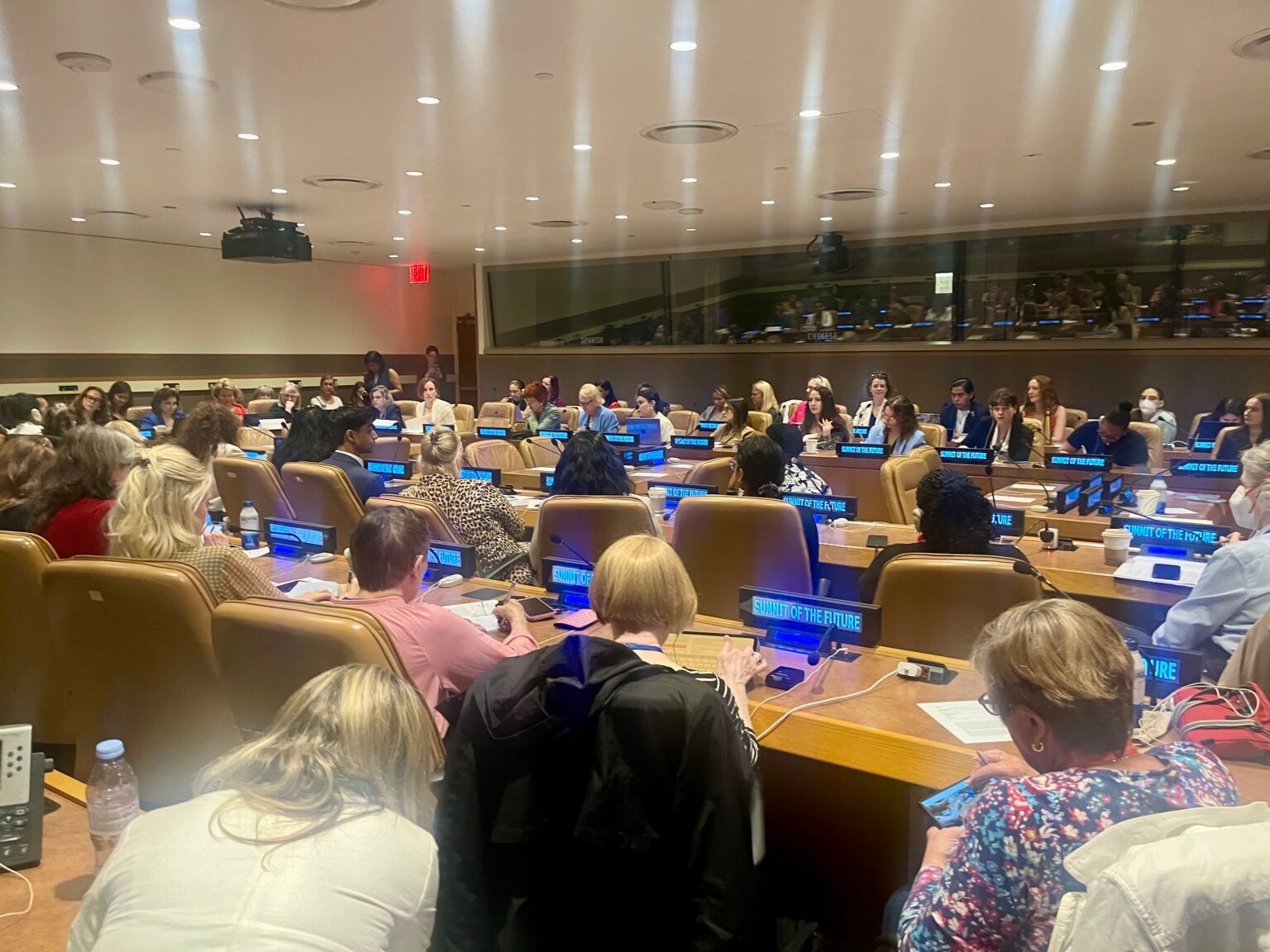
Share
“Why Language Matters in the Global Agenda for Gender Equality
By Leonora Souza Paula, Vital Voices Visionaries Fellow and a 2024 Center for Gender in Global Context Inspiration Award Winner. Leonora is a professor of Arts and Humanities at Michigan State University.
I had the privilege of participating in the event Translating the Gender Equality and Women’s Rights Commitments of the Pact of the Future into Transformative Action held as a side event during the UN Summit of the Future in New York from Sep 20-23. The event was organized by GWL Voices along with UN Women, C4UN, and the governments of Mexico, Spain, and Slovenia. The conversation focused on turning gender equality commitments into tangible actions and strengthening accountability mechanisms through enhanced cooperation between member states, civil society, and the private sector.
In my intellectual and advocacy work, I am constantly examining the role of language in shaping narratives that can empower or oppress. When I came across the event title, I was immediately drawn to the promise of much-needed action for gender equality in global spaces. But I was also intrigued by the use of the term ‘translating’ rather than, say, ‘implementing.’
One possible interpretation of this is that on a global stage where the SDGs were agreed upon, supposedly signaling a common language, there’s a gap in the grammar of human rights where gender equality seems like a complex discourse that still requires translation. Still, this did not seem like a reasonable explanation. But when we heard from María Fernanda Espinosa, GWL Voices Executive Director, that during the negotiation process of drafting the Pact for the Future, references to gender initially amounted to 10 mentions in a 55-page document that is supposed to guide action-oriented global governance, it became clear why. By the final draft, the number of references had increased to 35 mentions, which, according to Espinosa, “gives a sense of where we are as women.”
Ana Jimenez, Deputy Permanent Representative of Spain to the United Nations, highlighted the organized campaign “to not lose language” during the negotiation process to ensure that gender rights and women’s equality were “mainstreamed through the text.”
The fact that in 2024, civil society members and UN women leaders have to push for mainstreaming the gender perspective in the multilateral agenda is a measure of the delay in advancing the goals of SDG5. Given that “the language of the Pact of the Future lagged behind regarding the gender perspective,” as Nadine Gasman of the National Women’s Institute of Mexico noted, the effort towards transformative action could not be more urgent. Similarly, Florence Syevuo, Co-Chair of C4UN, spoke of “broken communication” in terms of prioritizing the SGDs and emphasized that the shared experience in the Global South is that commitments are made but not acted upon.
These observations corroborated my initial interpretation. They confirmed my assessment that, beyond translation, the lexicon of gender equality needs to be recognized as an official UN language.
Thanks to the work of GWL Voices, it has become clear that including language that ensures women and girls are at the center of all efforts is fundamental to advancing the SDGs. Meaningful participation and affirmative measures from the grassroots to high-level positions are vital to guarantee transformative action. The explicit reference to “encouraging nominations of women candidates for Secretary-General,” as mentioned by Sima Bahous, Executive Director of UN Women, along with the expansion of economic opportunities and the equitable distribution of decision-making power, are solutions that can accelerate progress.
And yet, largely missing in these discussions was an intersectional approach that considers systemic inequality at the intersection of race, place, age, ability, and other factors. Considering that the numerical majority of the people of the world (85%) are people of color, a universal approach to gender equality is harmful as it does not address the historical and structural causes of inequality. Failure to address systematic racism and racial discrimination severely limits progress toward development targets and reveals a practice of exclusion in the indexing of human rights and fundamental freedoms.
Finally, the GWL Voices event offered many examples of the extent to which global majority-civil society and women-led organizations continue to shape and create real impact at the local and global levels. Other events held during the Summit, such as the Black Women Shaping AfroFutures Forum, were remarkable examples of how the cross-pollination of tangible actions and the exchange of solutions are impacting communities and paving the way for a future that ensures gender equality and women’s rights in action.
The GWL Voices event “Translating the Gender Equality and Women’s Rights Commitments of the Pact of the Future into Transformative Action” was one of the side-events held at the UN HQ during the Action Days, here you can find GWL Voices’ key insights from the Summit of the Future and UNGA79.
